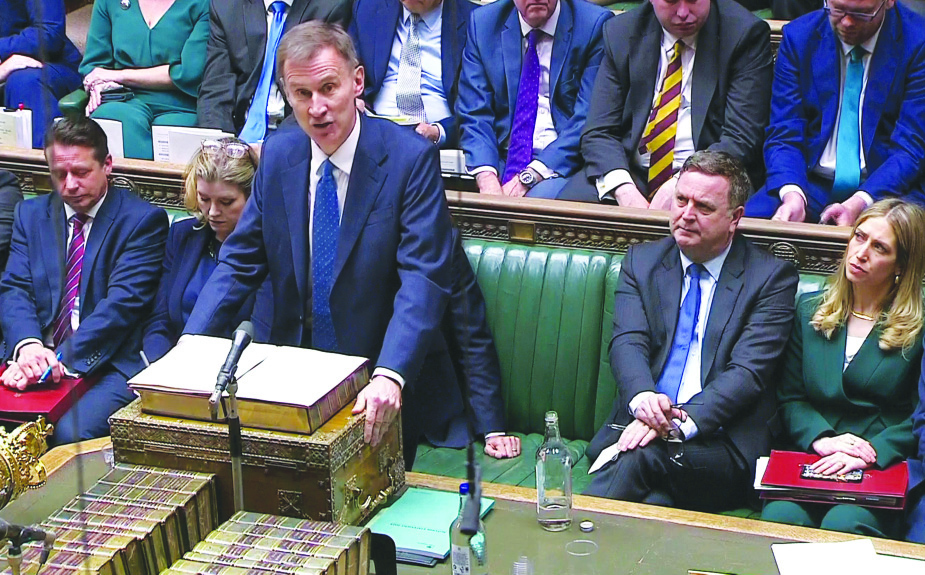UK's finance minister hails new tax cuts
By JONATHAN POWELL in London | China Daily Global | Updated: 2023-11-23 09:44

Jeremy Hunt says his budget will help get the nation's economy moving again
The United Kingdom's finance minister, Chancellor of the Exchequer Jeremy Hunt, announced tax cuts alongside many other measures to help grow the country's stagnating economy in his Autumn Statement budget, delivered in Parliament on Wednesday.
The statement focused on growth as the nation's economy looks to have turned a corner, with the annual inflation rate having fallen to 4.6 percent from the 10.7 percent average in the last quarter of 2022, and 6.7 percent in September.
Hunt also revealed the latest forecasts for the UK's economic growth, provided by the Office of Budget Responsibility, or OBR, which expects 0.6 percent growth this year, and 0.7 percent next year. After that, it will increase by 1.4 percent in 2025,1.9 percent in 2026, 2 percent in 2027, and 1.7 percent in 2028, the OBR said.
The chancellor said he will implement reductions in National Insurance tax and business tax, with support for entrepreneurs to raise capital, measures to "get behind our fastest growing industries", policies to unlock foreign direct investment, and steps to boost productivity.
Hunt told lawmakers that, taken together, the measures will increase business investment in the UK economy by around 20 billion pounds ($25 billion) a year during the next decade, to "get Britain growing".
Hunt said he will make the "full expensing" tax relief system for businesses permanent. The policy, which was due to expire in 2026, allows a company to immediately deduct all of its spending on IT equipment, plant or machinery from taxable profits.
He described this as "the largest business tax cut in modern British history" and said it means "the UK will have the lowest headline corporation tax rate of G7 economies, but also its most generous capital allowances". Hunt said the OBR estimates this measure alone will increase annual investment by 3 billion pounds a year.
"We know the way to back British business is to increase incentives to invest," he said.
Business rates will be frozen for small companies, along with a 75-percent discount in rates for retail, hospitality and leisure companies.
Social benefits will be increased in line with inflation, state pensions will be increased by 8.5 percent, and tax on alcohol will be frozen.
However, the tax on tobacco will increase, as will the national living wage, which will increase by 9.8 percent to 11.44 pounds an hour.
Hunt said 50 million pounds will be spent during the next two years, to increase the number of apprentices in engineering and other "key growth sectors", and 450 million pounds will be allocated to local authority housing funds to deliver 2,400 new homes.
And the chancellor said he wants to ensure more movies are made in the UK, noting the country's creative sector is worth 126 billion pounds a year to the economy. He said additional tax relief will be provided to attract investment.
In total, there were 110 different measures to help grow the UK economy included in the statement, said the chancellor.
"I said we would cut taxes when we could — but only responsibly and only in a way that did not fuel inflation," he said, describing the measures as "the biggest package of tax cuts to be implemented since the 1980s".
Shadow Chancellor Rachel Reeves, of the opposition Labour Party, said there was nothing Hunt could say or do to change what she called the Conservative Party's "appalling record", saying "after 13 years of economic failure, working people are worse off", under the Conservative Party.
























